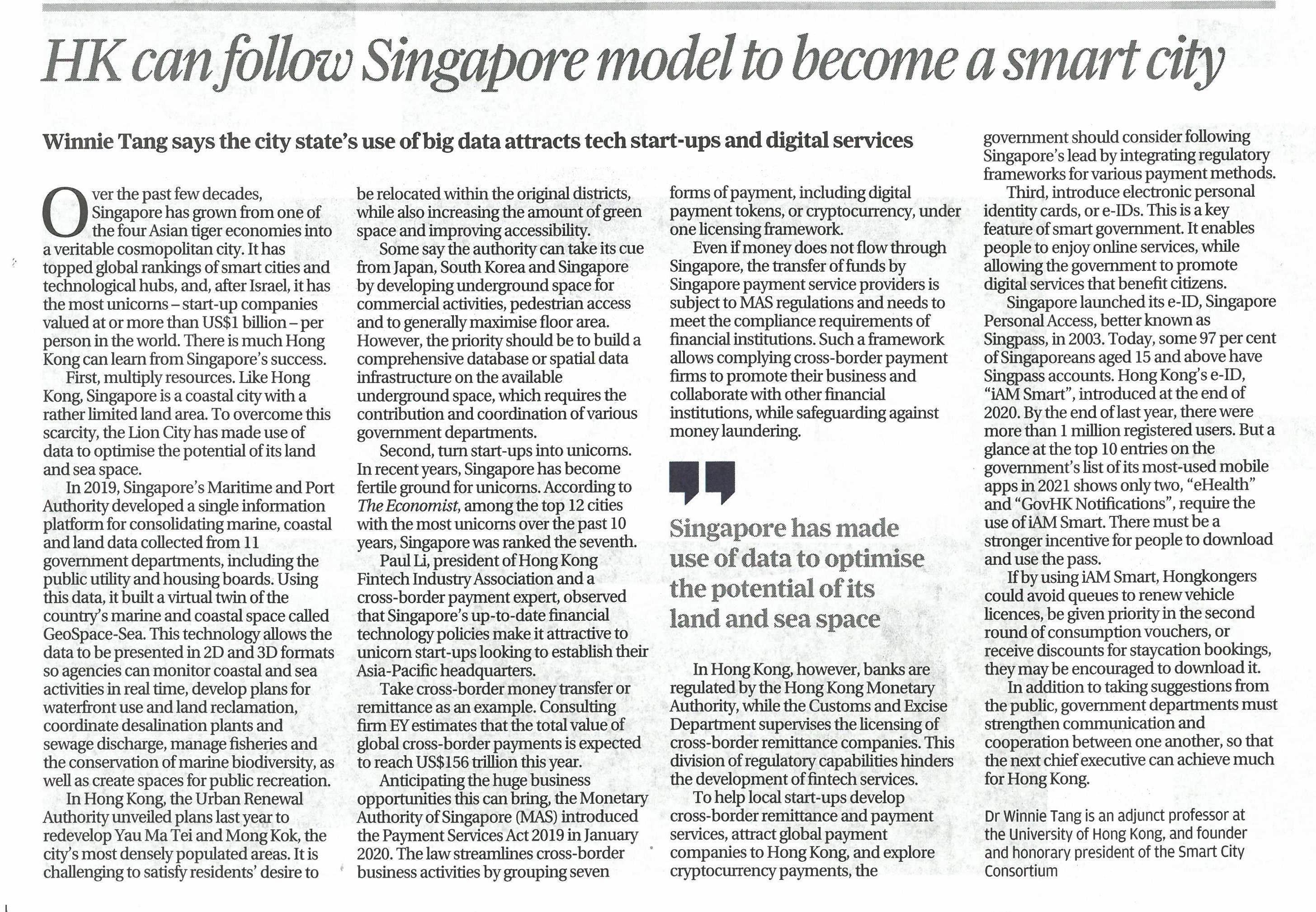網上版請按此

HK can follow Singapore model to become a smart city
Over the past few decades, Singapore has grown from one of the four Asian tiger economies into a veritable cosmopolitan city. It has topped global rankings of smart cities and technological hubs, and, after Israel, it has the most unicorns – start-up companies valued at or over US$1 billion – per person in the world. There is much Hong Kong can learn from Singapore's success.
First, multiply resources. Like Hong Kong, Singapore is a coastal city with a rather limited land area. To overcome this scarcity, the Lion City has made use of data to optimise the potential of its land and sea space.
In 2019, Singapore's Maritime and Port Authority developed a single information platform for consolidating marine, coastal and land data collected from 11 government departments, including the public utility and housing boards. Using this data, it built a virtual twin of the country's marine and coastal space called GeoSpace-Sea.
This technology allows the data to be presented in 2D and 3D formats so that government agencies can monitor coastal and sea activities in real time, develop plans for waterfront use and land reclamation, coordinate desalination plants and sewage discharge, manage fisheries and the conservation of marine biodiversity, as well as create spaces for public recreation.
In Hong Kong, the Urban Renewal Authority unveiled plans last year to redevelop Yau Ma Tei and Mong Kok, the city's most densely populated areas. It is challenging to satisfy residents' desire to be relocated within the original districts, while also increasing the amount of green space and improving accessibility.
Some have suggested that the authority can take its cue from Japan, South Korea and Singapore by developing underground space for commercial activities, pedestrian access and to generally maximise floor area. However, the priority should be to build a comprehensive database or spatial data infrastructure on the available underground space, which requires the contribution and coordination of various government departments.
Second, turn start-ups into unicorns. In recent years, Singapore has become a fertile breeding ground for unicorns. According to the Economist, among the top 12 cities with the most unicorns over the past 10 years, Singapore was ranked the seventh.
Paul Li, president of Hong Kong Fintech Industry Association and a cross-border payment expert, observed that Singapore's up-to-date financial technology policies make it attractive to unicorn start-ups looking to establish their Asia-Pacific headquarters.
Take cross-border money transfer or remittance as an example. Consulting firm EY estimates that the total value of global cross-border payments is expected to reach US$156 trillion this year.
Anticipating the huge business opportunities this can bring, the Monetary Authority of Singapore (MAS) introduced the Payment Services Act 2019 in January 2020. The law streamlines cross-border business activities by grouping seven forms of payment, including digital payment tokens, or cryptocurrency, under one licensing framework.
Even if money does not flow through Singapore, the transfer of funds by Singapore payment service providers is subject to MAS regulations and needs to meet the compliance requirements of financial institutions. Such a framework allows complying cross-border payment companies to promote their business and collaborate with other financial institutions, while safeguarding against money laundering.
In Hong Kong, however, banks are regulated by the Hong Kong Monetary Authority, while the Customs and Excise Department supervises the licensing of cross-border remittance companies. This division of regulatory capabilities hinders the development of fintech services.
To help local start-ups develop cross-border remittance and payment services, attract global payment companies to Hong Kong, and explore cryptocurrency payments, the government should consider following Singapore's lead by integrating regulatory frameworks for various payment methods, including cross-border remittance, stored value facilities (e-wallets) and encrypted payments. This would allow the city to seize global business opportunities.
Third, introduce electronic personal identity cards, or e-IDs. This is an important feature of smart government. It enables people to enjoy online services, while allowing the government to promote digital services that benefit citizens.
Singapore launched its e-ID, Singapore Personal Access, better known as Singpass, in 2003. Today, Singaporeans can also download the Singpass mobile application to set up a digital identity card. The pass is used for accessing almost all government services, from booking medical consultations and borrowing books from public libraries to entering government buildings, applying for a passport or renting a flat.
Some 97 per cent of Singaporeans aged 15 and above now have Singpass accounts and there are more than 3.2 million Singpass app users.
Hong Kong’s e-ID, "iAM Smart", was officially launched at the end of 2020. By the end of last year, there were over 1 million registered users.
According to the government, iAM Smart gives users access to "more than 160 commonly used government, public and private online services", but a glance at the top 10 entries on the government's list of its most-used mobile apps in 2021 reveals that only two, "eHealth" and "GovHK Notifications", require the use of iAM Smart. There must be a much stronger incentive for people to download and use the pass.
If by using iAM Smart, Hongkongers could avoid having to queue to renew vehicle licences, be given priority in the second round of consumption vouchers, or receive discounts for staycation bookings, they may be encouraged to download it.
In addition to taking suggestions from the public, government departments must strengthen communication and cooperation between one another, so that the next chief executive can achieve much for Hong Kong.
Dr. Winnie Tang
Adjunct Professor, Department of Computer Science, Faculty of Engineering; Department of Geography, Faculty of Social Sciences; and Faculty of Architecture, The University of Hong Kong